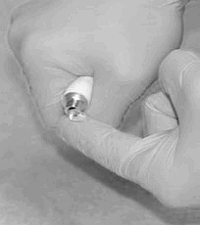
That failure, several researchers said, was the last nail in the coffin for this type of microbicide — gels containing molecules that clump around the virus before it reaches the vaginal wall. Attention is now turning to gels and rings that release constant doses of antiretroviral drugs to kill the virus or stop it from reproducing.
The trial took four years and involved 9,385 women in four African countries. Known by the nickname MDP 301 (for Microbicides Development Program), the trial was overseen by the British Medical Research Council, which announced the results.
The gel had no effect: 4.1 percent of those who used it were infected, as were 4 percent of those who used a placebo.
“It is bitterly disappointing for us, but it will inform the way we go forward,” Dr. Sheena McCormack, the trial’s chief investigator, said in an interview.
The microbicide, PRO 20000, is a polymer of naphthalene sulphonate, which Dr. McCormack described as “a large sugary molecule with a charge on it” that clings to receptors on the shell of the virus.
It had worked nearly perfectly on cells in the laboratory and in monkeys. Hopes were raised further in February when a smaller trial, sponsored by the National Institutes of Health, suggested that it might be 30 percent effective, but produced results that were not statistically significant.
This trial recruited women in South Africa, Zambia, Uganda and Tanzania. Some were from the general population, some worked at highway truck stops, and some were not infected but married to men who were. All were also given condoms and told to try to use them before any sex act; that makes any such trials take far longer and produces much less robust results, but to fail to offer condoms and sex advice would have been unethical.
Because they know women can’t use microbicides 100 percent of the time, Dr. McCormack said that even if the gel had worked only a third of the time, “we would have been ecstatic.”
Making a safe, acceptable, effective microbicide has proved far more difficult than researchers predicted 20 years ago. While prostitutes can sometimes get men to use condoms, wives and lovers often cannot, and may also want to become pregnant without being infected. They will use only something that is not unpleasantly messy or sticky, and it must block a tiny virus without blocking sperm, which are thousands of times larger.
Researchers are beginning to test gels and rings containing antiretroviral drugs like tenofovir, dapivirine and maraviroc.
The advantage of those, said Zeda F. Rosenberg, chief executive officer of the International Partnership for Microbicides, is that they are very potent and attack different parts of the virus. And, because they are given vaginally, relatively big doses can be used without toxicity, which is a threat when the drugs are taken by mouth.
The new gels being tested must be inserted before and sometimes after sex. The rings, which fit near the cervix, are meant to be replaced monthly.
Mitchell Warren, executive director of AVAC, an advocacy group for AIDS vaccines, microbicides and other means for blocking the disease, called the results disappointing, but said the large trial would pave the way for future ones. In Africa, it is often difficult to round up thousands of volunteers and to build the laboratories and fieldwork staffs needed to follow participants for years.